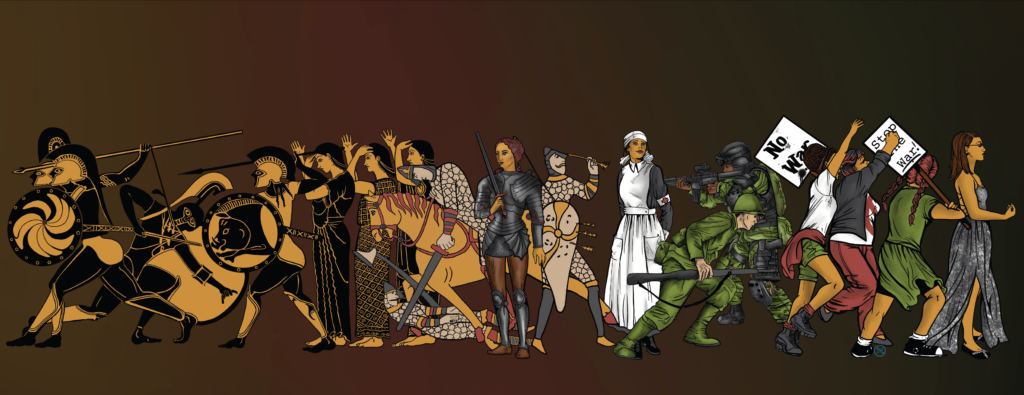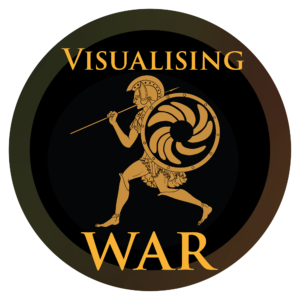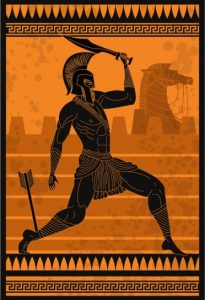War and Peace
War is as old as humanity itself. For centuries, people have been turning to antiquity to reflect on, try to understand and even get better at doing war themselves. Tragically, the same cannot be said for peace.

Ancient warfare sells. Battle narratives from ancient Greek epic and historiography have long influenced how later strategists approached military strategy in their own day. Ancient heroes like Achilles and Odysseus have shaped ideals of military glory, leadership and self-sacrifice that still prevail – while the representation of their female counterparts has influenced discourses of gender, victimhood and grief. Scholars have constructed modern theories about civil war that start with the Roman Republic. Many practices of remembrance and commemoration have their roots in antiquity, and the war memorials that we walk past in modern towns and cities often incorporate a Classical aesthetic. Ancient Warfare Magazine has thousands of subscribers; games like Rome Total War and Spartan Wars: Blood and Fire are played by millions; and films like 300 continue to shape how viewers imagine war itself, not just Ancient Greek battles. Our habits of visualising war today have long been influenced by Classical antiquity – and not always in healthy or helpful ways.
What can ‘Applied Classics’ do? One contribution is simply to draw attention to the influence that ideas and representations of ancient warfare still have on how we (military professionals, novelists, film-makers, game designers, the general public…) understand, imagine and approach war today, raising awareness of entrenched habits of thought – and how limiting they might be. As we discuss elsewhere on this site, ‘Applied Classics’ sometimes also involves countering misrepresentations and misuses of the past, to prevent further harm; various Classicists are already active in this space, such as Owen Rees and Roel Konijnedik. More positively, there is scope for more work on how peace was perceived, experienced and achieved in antiquity, which might have valuable things to contribute to modern understanding and peace-building practices. The options are many and varied. Ancient warfare has been influencing later ideas and behaviour since antiquity itself: ‘Applied Classics’ can take that influence in new directions.
In the posts below, we showcase some of the ways in which the University of St Andrews’ Visualising War and Peace project has been exploring connections between ancient and modern habits of imagining, experiencing, narrating, understanding, pursuing, preventing, mitigating and resolving conflict.
The Visualising War and Peace podcast
In April 2021, Alice König and Nicolas Wiater set up the Visualising War and Peace podcast. Stemming from their research into discourses of war and peace in antiquity, this outreach project was designed to involve more people in discussions of how war stories work and what they do to us. With that goal in mind… Read More
Staging War Stories
How and why do we dramatize war? What are audiences expecting when they watch representations of war on stage and screen? And what impact do dramatizations of war have on how people experience, understand and even conduct it? In 2021, the Visualising War project hosted an online event with professional theatre company NMT Automatics to explore how war gets… Read More
Tempus Fugit: Troy and Us
NMT Automatics performing Tempus Fugit at the Troy Exhibition, British Museum, 2021 During the Summer of 2019, professional theatre company NMT Automatics visited St Andrews University. They were developing their new show, Tempus Fugit: Troy and Us, in collaboration with The Centre for the Public Understanding of Greek and Roman Drama, and were introduced to Dr Alice König… Read More
From Achilles to Afghanistan
Art by Zofia Guertin In 2017, University of St Andrews staff Alice König and Nicolas Wiater founded the Visualising War project. Working from antiquity to the present day, they explore the ways in which war stories in different media have influenced each other across space and time, shaping wider cultural discourses. They are particularly interested in the feedback-loop between… Read More



